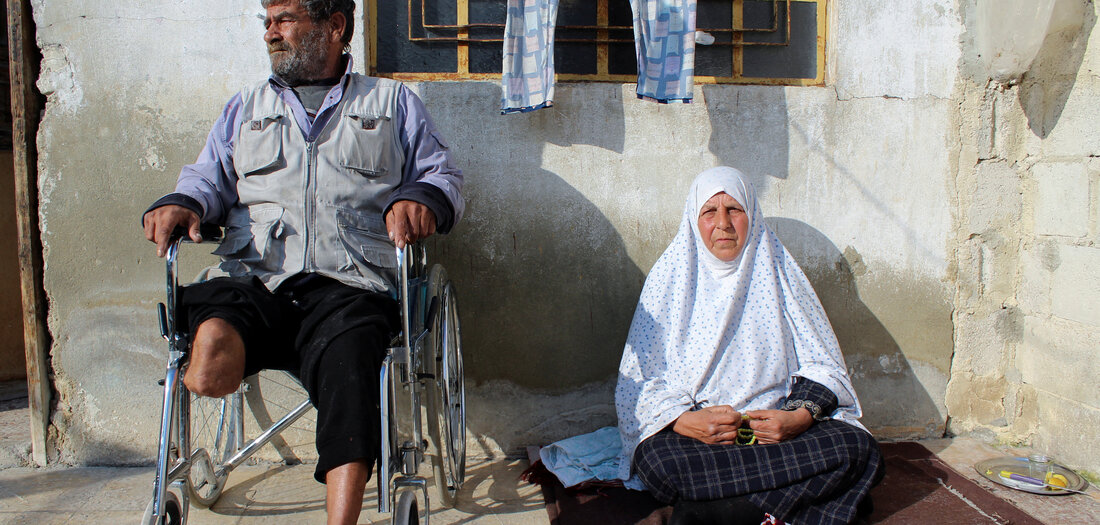Blockade against Damascus (daily newspaper Junge Welt)
Unsure of help: sanctions also prevent war victims from being cared for (Kafr Batna, Ghouta, January 11, 2023)
As scheduled, the UN Security Council once again discussed “political and humanitarian developments” in Syria on Wednesday. The panel was briefed by the UN special envoy for Syria, Norwegian diplomat Geir Otto Pedersen, and Ghada Eltahir Mudawi, acting director of the United Nations Office for the Coordination of Humanitarian Affairs (OCHA), under whose authority all UN relief operations in Syria are managed Syria take place.
Syrian ambassador to the UN Bassam Sabbagh accused the US of destabilizing the situation in Syria with its behavior in the UN Security Council and its political actions in the Middle East. “The illegitimate troop presence” threatens the country’s security and territorial integrity, he said, according to the agency SANA. The country’s resources would be plundered, “mainly oil, gas and wheat.”
Not much is changing when it comes to Syria in the UN Security Council. The information presented by the UN officials remains bureaucratic and confusing, the veto powers exchange their known positions. A new statement was made by Switzerland and Brazil, which have been members of the committee since the beginning of the year. Ireland and Norway dropped out after two years.
It is about the (still) status of the deliberations in the Syrian “constitutional committee”, which has not met since June 2022. According to Pedersen, this is also due to the concerns expressed by Russia about Switzerland. The constitutionally “neutral” country had bowed to pressure from Brussels and Washington last year and accepted EU sanctions against Russia because of the war in the affiliated Ukraine. Since then, every new package of EU sanctions against Russia has been adopted by the Swiss government. One of the consequences of this is that Russian government members such as Foreign Minister Sergey Lavrov can no longer travel to Geneva.
As a result, Russia had suggested another, neutral place in the UN Security Council for the continuation of talks by the Syrian “constitutional committee”. The three strongest veto powers – the USA, Great Britain and France – have not responded.
All UN veto states (in addition to the three modern ones, China and Russia) as well as Germany are considered the “guarantee powers” of the political process for Syria, which is to take place under the umbrella of the United Nations in Geneva between the government, a selected opposition and civil society groups. The basis is the UN Security Council Resolution 2254 from 2015. The process is stagnating.
The UN special envoy Pedersen is trying to get the various “stakeholders” or interest representatives around one table. In December he met Syrian Foreign Minister Faisal Mekdad in Damascus and Turkish Foreign Minister Mevlut Cavusoglu in Ankara. On the fringes of the World Economic Forum in Davos, Pedersen spoke to Saudi Foreign Minister Faisal bin Farhan Al Saud. He met with diplomatic Syria envoys from Great Britain, France, the USA and Germany (the “Quad Syria Envoys”) in Geneva on Tuesday to discuss how “trust and confidence” could be created. There is no progress to report.
A joint statement by the so-called Quad Syria officials said they “unwaveringly” supported Pedersen’s work to “achieve a political solution to the conflict in Syria in accordance with UN Security Council Resolution 2254.” This offers “the only viable solution to the conflict” and it looks forward to working “with partners in the region and with the opposition within this framework”.
According to a UN report, Pedersen is trying to find out what concessions stakeholders would be willing to make in exchange for other measures. These include abductees, prisoners, the disappeared, humanitarian aid and “early recovery projects” that can circumvent the unilateral economic sanctions imposed by the EU and the US, giving Syria a chance to rebuild.
According to the UN, at least 125 humanitarian aid organizations successfully implemented 374 projects in all 14 Syrian provinces last year. Donor countries are said to have transferred 517 million US dollars for the program.




